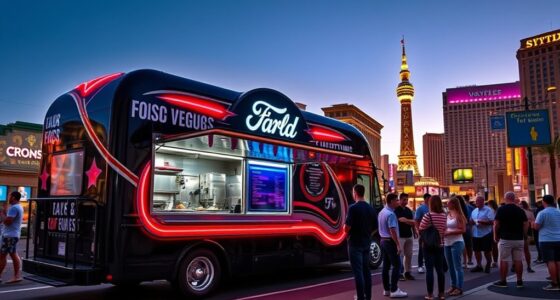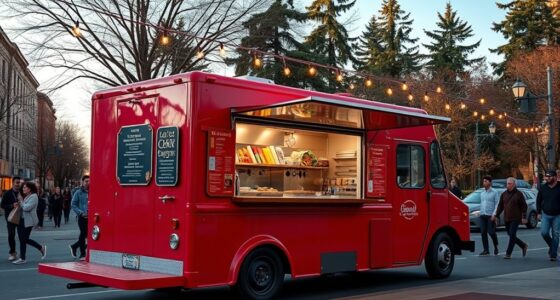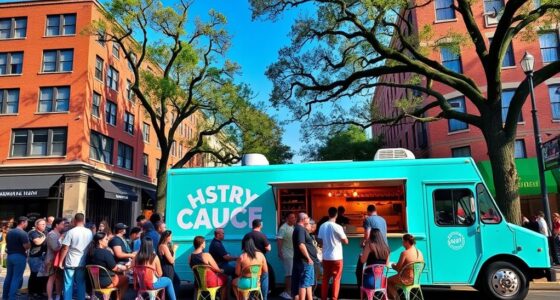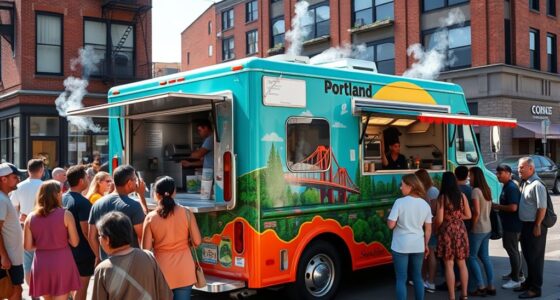To start a food truck in Chicago, IL, you need to understand local regulations, secure permits from the Chicago Department of Business Affairs, and schedule inspections for health standards. Choose busy neighborhoods like Wicker Park or Lincoln Park to boost visibility. Find a compliant commissary, set up your branding, and plan your menu with local ingredients. Staying on top of parking rules and marketing strategies is key—continue exploring to learn the full steps to launch successfully.
Key Takeaways
- Obtain necessary permits and licenses through the Chicago Department of Business Affairs, including food truck and shared kitchen licenses.
- Identify designated parking zones, understand street cleaning schedules, and secure special permits for food truck operation.
- Develop a compliant menu featuring locally sourced ingredients and seasonal options to attract customers and build loyalty.
- Explore funding sources like bank loans, SBA programs, and grants for startup capital, and secure liability insurance.
- Implement contactless payment, inventory management, and social media marketing to optimize operations and attract customers.
Navigating Chicago’s Food Scene

Chicago’s vibrant food scene offers plenty of opportunities, but it also requires some strategic navigation. To succeed, you need to understand the city’s diverse neighborhoods, each with its unique vibe and customer base. Popular Chicago neighborhoods like Wicker Park, Lincoln Park, and the Loop attract large crowds, making them ideal spots for food trucks. Equally important is planning your food truck routes carefully. Identify high-traffic areas and events to maximize your visibility and sales. Keep an eye on local events and festivals that draw crowds. By mapping out your routes thoughtfully and targeting busy neighborhoods, you’ll increase your chances of building a loyal customer base and thriving in Chicago’s competitive food scene. Additionally, understanding local regulations and obtaining the necessary permits is essential to operating legally and avoiding fines.
Understanding Local Requirements
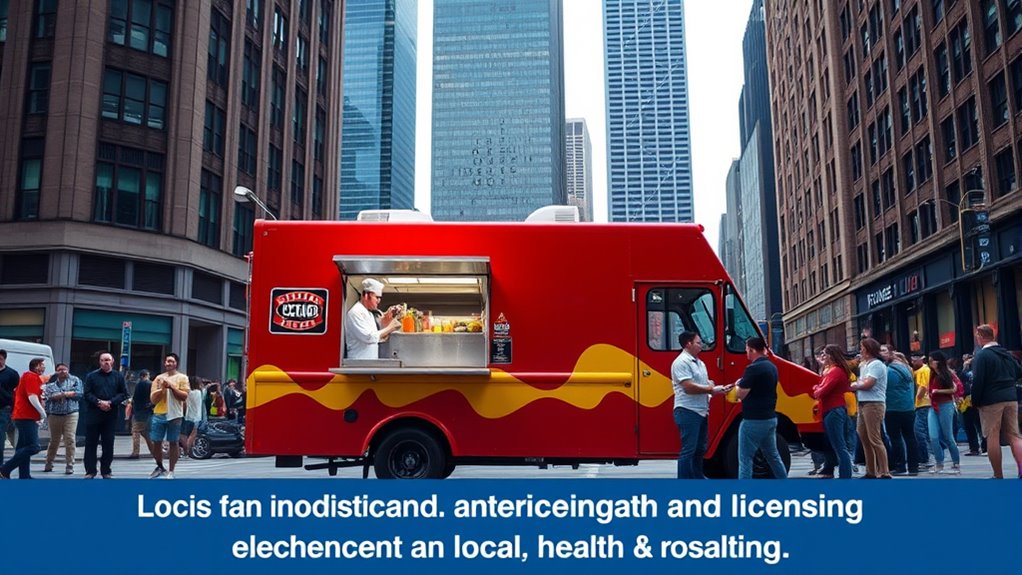
To get started, you’ll need to complete the online permit application and pass a food safety inspection to meet Chicago’s health standards. It’s also important to identify designated street parking zones where you’re allowed to operate your food truck. Understanding these requirements helps guarantee you stay compliant and avoid costly penalties. Additionally, being aware of local regulations and guidelines related to food truck operations ensures you are fully prepared to launch your business smoothly.
Online Permit Application Process
Are you aware of how to navigate Chicago’s online permit application process for food trucks? The online permit is your first step to legally operating in the city. To start, visit the official Chicago Department of Business Affairs and Consumer Protection website. The application process is straightforward: create an account, fill out the necessary details about your food truck, and upload any required documents. Make sure to review all instructions carefully to avoid delays. Once submitted, you’ll receive confirmation and updates through your online portal. Processing times vary, so plan ahead. Completing this online permit application correctly is essential for compliance and smooth business operations. Keep track of your application status and be prepared to respond to any additional requests from city officials.
Food Safety Inspection Checklist
After submitting your online permit application, it’s important to familiarize yourself with the food safety inspection requirements specific to Chicago. The city’s inspection checklist guarantees your truck meets all safety standards. This checklist covers key areas like food storage, sanitation, and equipment maintenance. To help you prepare, review the following inspection categories:
| Category | Requirements | Notes |
|---|---|---|
| Food Storage | Proper temperature and labeling | Keep cold foods cold |
| Sanitation | Clean surfaces and utensils | Regular sanitizing |
| Employee Hygiene | Handwashing and glove use | Maintain hygiene standards |
| Equipment | Proper functioning and cleaning | Ensure all equipment works |
| Pest Control | No signs of pests | Regular pest inspections |
Use this checklist to stay compliant and pass inspections with confidence.
Designated Street Parking Zones
Understanding the designated street parking zones in Chicago is essential for operating your food truck legally and efficiently. You need to be aware of specific areas where parking is allowed and times when parking restrictions are enforced. Visualize:
- Signs indicating no parking during street cleaning hours, which happen regularly to keep streets tidy.
- Zones where parking enforcement actively patrols, issuing tickets for violations.
- Special permit areas that allow food trucks to park without conflict with regular street parking rules.
Knowing these zones helps you avoid fines and towing. Pay close attention to signage and posted hours, especially during street cleaning days. Properly parking within designated zones ensures smooth operations and compliance with local regulations, making your food truck business run seamlessly.
Setting Up Your Base of Operations

To establish your base of operations, you’ll need to comprehend shared kitchen licensing requirements in Chicago and how they relate to your situation. Planning your kitchen layout carefully guarantees you meet health codes and maximize efficiency. Once you have these pieces in place, you’ll be ready to operate smoothly and stay compliant. Considering best practices in food safety and licensing can further streamline your setup process.
Shared Kitchen Licensing Requirements
Setting up your food truck’s base of operations often involves securing a shared kitchen license, which guarantees your facility complies with local health and safety standards. This process ensures you meet the requirements of shared kitchen licensing and adheres to kitchen co-op regulations. You’ll need to:
- Submit an application demonstrating your kitchen meets sanitation standards.
- Pass health inspections verifying cleanliness and safety protocols.
- Obtain necessary permits specific to shared-use facilities in Chicago.
Custom Kitchen Layout Planning
Designing your kitchen layout is a crucial step that determines how efficiently you can prepare food and stay compliant with health regulations. Focus on kitchen ergonomics to ensure your workflow minimizes unnecessary movement, reducing fatigue and increasing productivity. Proper equipment placement is essential; position appliances and workstations logically to streamline food prep and cleaning processes. Consider your menu to determine the best layout—whether it’s a straight-line, L-shape, or island setup—making sure everything you need is within easy reach. This planning helps maximize space, enhance safety, and improve compliance with health codes. Take time to map out your kitchen carefully, balancing functionality with safety, so your food truck operates smoothly and efficiently from day one.
Budgeting and Financing Your Food Truck
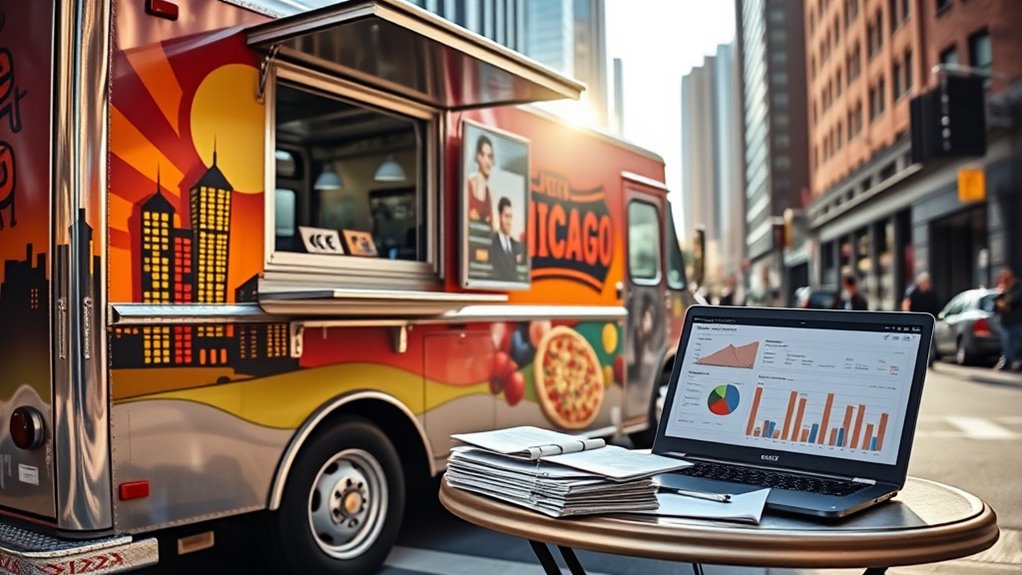
To get your food truck off the ground, you need to plan your budget carefully, starting with the initial vehicle and equipment costs. You should also explore small business loan programs available in Chicago to help fund your venture. Additionally, understanding liability and payroll policies guarantees you’re financially protected as you grow.
Initial Vehicle and Equipment Purchase
Securing the right vehicle and equipment is a crucial first step, and understanding your budget can help you make informed decisions. When purchasing your food truck, picture it as:
- A fully-equipped kitchen with appliances, prep stations, and storage compartments.
- A reliable vehicle designed for easy maneuvering and frequent parking in Chicago’s busy streets.
- Adequate equipment storage to keep tools, ingredients, and supplies organized and accessible.
Ensure you consider vehicle maintenance costs to avoid surprises later. Look for a truck with good fuel efficiency and durability. For equipment storage, prioritize space and security to protect your investment. Staying within your budget while choosing quality ensures smooth operations and long-term success.
Small Business Loan Programs
Finding the right vehicle and equipment is just the first step; financing your food truck is equally important. Small business loan programs can help you secure funds needed for startup costs. In Chicago, several options exist, including traditional bank loans, SBA loans, and community-based programs. These loans often require a solid business plan and proof of revenue potential. Look into small business grants, which don’t require repayment, and seek startup mentorship programs that can guide you through the application process. To compare your options, consider this overview:
| Program Type | Benefits | Requirements |
|---|---|---|
| Small Business Grants | No repayment, free funding | Competitive, detailed proposal |
| SBA Loans | Favorable interest rates | Collateral, good credit score |
| Local Community Funds | Support local entrepreneurs | Residency, business plan |
| Startup Mentorship | Expert guidance, networking | Commitment of time |
| Bank Loans | Larger funding amounts | Collateral, strong credit |
Liability and Payroll Policies
Establishing clear liability and payroll policies is essential for maintaining financial stability and legal compliance as you operate your food truck. Proper liability insurance protects you from potential claims, ensuring your business stays afloat in unforeseen circumstances. Effective payroll management helps you pay your staff accurately and on time, avoiding legal issues and employee dissatisfaction. To get started:
- Secure liability insurance coverage that suits your food truck operations.
- Implement a payroll system that tracks hours, taxes, and deductions reliably.
- Create policies for handling employee wages, overtime, and benefits clearly.
Designing Your Menu and Pricing Strategy

Choosing locally sourced ingredients can help you create fresh, appealing dishes that stand out. You’ll need to calculate the cost per dish carefully to set competitive prices that cover expenses and guarantee profit. Balancing quality and affordability is key to designing a menu that attracts customers and keeps your business sustainable. Incorporating strong communication skills can also assist in effectively marketing your menu and engaging with customers to build loyalty.
Locally Sourced Ingredient Choices
Incorporating locally sourced ingredients into your menu not only supports nearby farmers and producers but also allows you to craft fresh, authentic dishes that resonate with Chicago’s community. Embracing farm-to-table principles and using organic ingredients elevates your offerings and appeals to health-conscious customers. Imagine this:
- Freshly harvested heirloom tomatoes from a local farm, bursting with flavor.
- Organic Illinois-raised chicken, tender and juicy, perfect for tacos or sandwiches.
- Vibrant greens from neighborhood farmers, ideal for salads or garnishes.
These ingredients help you create seasonal menu items that showcase Chicago’s rich agricultural diversity. By prioritizing locally sourced, organic ingredients, you build a reputation for quality and authenticity that attracts loyal customers seeking genuine, farm-to-table experiences.
Cost per Dish Calculation
Understanding your cost per dish is essential for setting a profitable menu and pricing strategy. To do this, focus on accurate ingredient cost calculation by tracking the cost of each ingredient used in your recipes. Proper dish portioning helps ensure consistency and prevents overspending on larger portions. Break down each dish into its components, and assign precise portion sizes to avoid waste. Calculate the total cost of ingredients for each portion, including spices and garnishes. Once you know your ingredient costs, add any additional expenses like labor and overhead. This detailed approach allows you to determine a fair selling price that covers costs while ensuring profit. Regularly review your dish portioning and ingredient costs to stay competitive and maintain profitability.
Technology and Operations
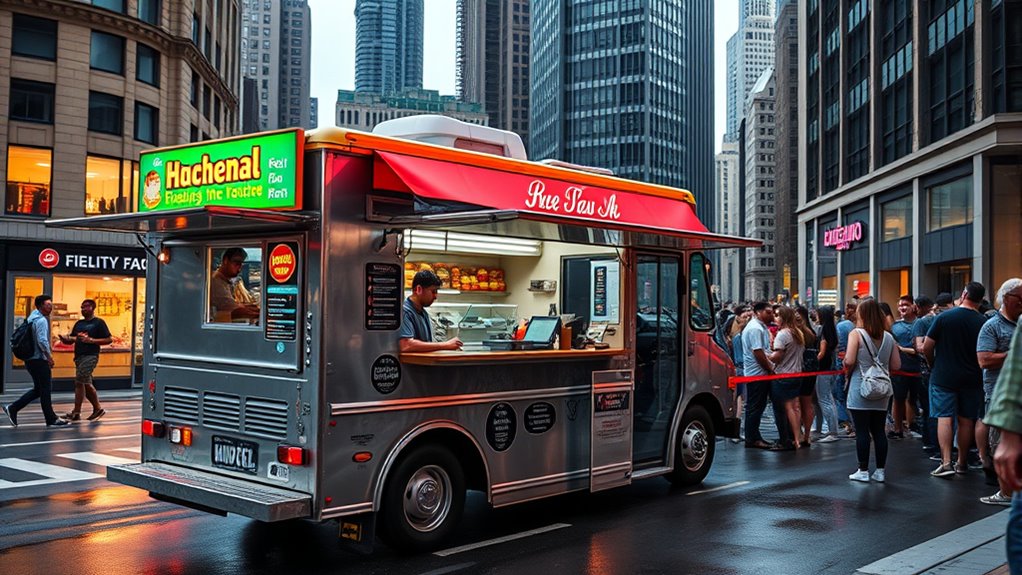
Implementing contactless payment options makes transactions faster and safer for your customers. Using real-time stock tracking software helps you stay on top of inventory and avoid shortages. These technologies streamline your operations and keep your food truck running smoothly. Additionally, understanding your personality traits can enhance team communication and improve customer interactions, contributing to a more efficient business environment.
Contactless Payment Options
Adopting contactless payment options can streamline your food truck’s operations and enhance customer experience by making transactions faster and more secure. With contactless payments, customers simply tap their smartphones or cards, enabling smooth cashless transactions that reduce wait times. Imagine these scenarios:
- A customer quickly taps their phone on your POS terminal, completing payment in seconds.
- Customers avoid fumbling for cash or cards, keeping lines moving efficiently.
- Your staff can focus more on service rather than handling cash, reducing errors and theft risks.
Real-Time Stock Tracking Software
Real-time stock tracking software is essential for keeping your food truck’s inventory organized and responsive. It streamlines inventory management by providing instant updates on stock levels, so you never run out of key ingredients. With accurate sales analytics, you can identify popular items and adjust your inventory accordingly, reducing waste and maximizing profits. This technology allows you to monitor sales trends in real-time, helping you make quick decisions on restocking or menu adjustments. By integrating stock tracking with your sales data, you gain a clear picture of what’s working and what’s not. This proactive approach ensures you stay prepared during busy hours and avoid shortages, ultimately improving your efficiency and customer satisfaction.
Marketing and Growing Your Presence
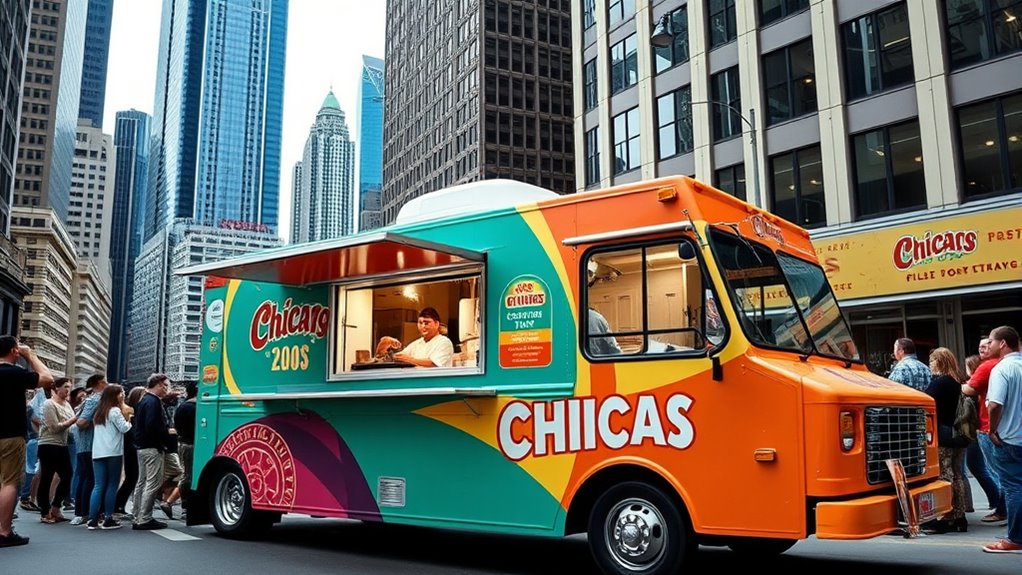
You can boost your food truck’s visibility by participating in popular Chicago food festivals, where you’ll connect with new customers and build your reputation. Engaging with Instagram foodie communities allows you to showcase your dishes and create buzz around your brand. Combining these strategies helps grow your presence and attract loyal fans to your truck.
Popular Chicago Food Festivals
Participating in popular Chicago food festivals is one of the most effective ways to boost your food truck’s visibility and attract new customers. These festivals draw crowds enthusiastic to taste diverse offerings from local food artisans and discover new favorites. Imagine serving up your signature dishes alongside other Chicago food trucks, surrounded by vibrant booths and lively music. To make the most of these events, consider these opportunities:
- Collaborate with local food artisans to create unique, shareable dishes.
- Position your truck near high-traffic areas to maximize footfall.
- Use festival exposure to build relationships and grow your following.
Engaging Instagram Foodie Communities
To effectively grow your food truck’s presence in Chicago, engaging with Instagram foodie communities is essential. Start by using popular foodie hashtags to reach local audiences enthusiastic to discover new eats. Posting high-quality photos of your dishes, trucks, and behind-the-scenes moments helps attract followers and build excitement. Collaborate with local influencers and food bloggers through Instagram collaborations; they can showcase your food to wider audiences and generate buzz. Engage actively by commenting on posts, sharing user-generated content, and responding to followers. These interactions foster loyalty and encourage more customers to try your truck. Consistency is key—regularly posting and participating in Chicago’s vibrant food scene will help you stand out among competitors and turn followers into loyal customers.
Master Local Food Trends
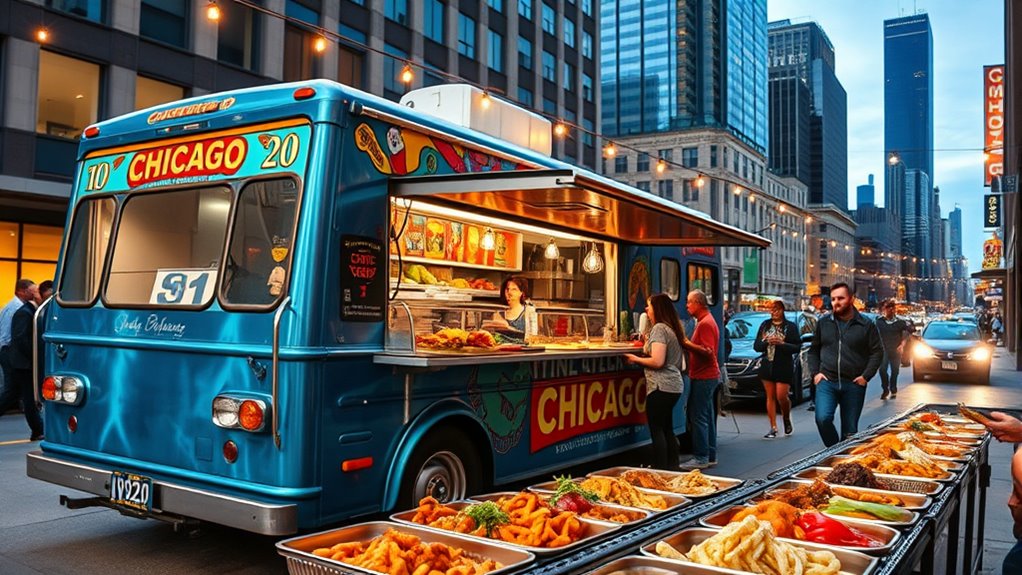
Staying ahead of local food trends is essential for making your Chicago food truck stand out. By mastering these trends, you can strengthen your food truck branding and build customer loyalty. Imagine serving:
- Innovative fusion dishes that excite taste buds and spark conversations
- Locally sourced ingredients that showcase Chicago’s unique flavors
- Sustainable packaging that appeals to eco-conscious consumers
Keeping up with these trends not only attracts new customers but keeps regulars coming back. Incorporate trending ingredients and presentation styles into your menu to stay relevant. Sharing your trend-savvy approach on social media enhances your brand image and connects with your audience. When you demonstrate awareness of local food movements, you position yourself as a must-visit food truck in Chicago, creating a loyal customer base enthusiastic for the next culinary hit.
Frequently Asked Questions
What Are the Best Locations to Park a Food Truck in Chicago?
You should park your food truck in high-traffic areas like Navy Pier, Millennium Park, or the Loop, where parking regulations permit street vending. Avoid busy downtown spots during peak hours to bypass traffic congestion and parking restrictions. Scout neighborhoods with lively events or parks where permit rules are flexible. Always check local parking regulations beforehand to verify you’re compliant, and consider nearby parking garages or lots for easier access.
How Do Chicago’s Weather Conditions Affect Food Truck Operations?
Chicago’s weather can be tough on your food truck, especially in winter and summer. You should focus on vehicle weatherproofing to protect against snow, rain, and extreme heat. Incorporate seasonal menu planning to adapt to changing conditions and customer preferences. By prepping your truck and menu for weather fluctuations, you guarantee smooth operations year-round and keep customers coming back no matter the season.
Are There Any Specific Chicago Food Truck Festivals or Events?
Yes, Chicago hosts several popular food truck festivals and Chicago Foodie Events throughout the year. You can participate in events like the Chicago Food Truck Festival, which draws large crowds enthusiastic to try diverse cuisines. These festivals boost your visibility and connect you with local food lovers. Make sure to check event dates and registration details early, so you can showcase your food truck at these exciting opportunities and grow your customer base.
What Permits Are Required for Nighttime Food Truck Operations?
You need to obtain food vendor permits and follow nighttime operation regulations to run your food truck at night in Chicago. The city requires a valid Mobile Food Vendor Permit, which involves applying through the Chicago Department of Business Affairs and Consumer Protection. You must also adhere to specific rules for nighttime operations, such as curfews, parking restrictions, and health standards. Ensuring compliance keeps your business legal and safe for customers.
How Can I Build a Loyal Customer Base in Chicago’s Diverse Neighborhoods?
To build a loyal customer base in Chicago’s diverse neighborhoods, focus on community engagement, cultural customization, and authentic interactions. Attend local events, support neighborhood causes, and tailor your menu to reflect local tastes. Engage with customers personally, listen to their feedback, and adapt your offerings accordingly. Consistently show genuine care, foster relationships, and celebrate cultural diversity, turning first-time customers into loyal supporters who appreciate your dedication and local flavor.
Conclusion
Starting a food truck in Chicago is an exciting venture with huge potential. Did you know that Chicago’s food truck scene grew by over 20% last year? With the right planning, local knowledge, and a bold menu, you can tap into this thriving market. Focus on building your brand and staying ahead of trends, and you’ll turn your food truck into a must-visit spot in the Windy City. Your success is just around the corner!


